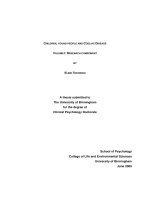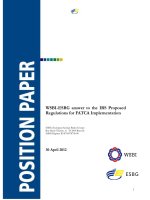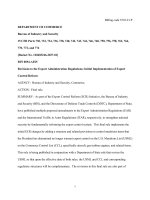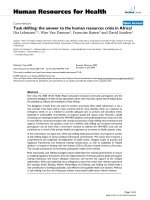WSBI-ESBG answer to the IRS Proposed Regulations for FATCA Implementation pptx
Bạn đang xem bản rút gọn của tài liệu. Xem và tải ngay bản đầy đủ của tài liệu tại đây (259.4 KB, 7 trang )
2
-
WSBI-ESBG answer to the IRS Proposed
Regulations for FATCA Implementation
ESBG (European Savings Banks Group)
Rue Marie-Thérèse, 11 - B-1000 Brussels
ESBG Register ID 8765978796-80
30 April 2012
3
Doc 0509/2012
RDE
Dear Ms. Corwin, Mr. Danilack and Mr. Musher,
The World Savings Banks Institute (“WSBI”) and the European Savings Banks Group (“ESBG”) is a
joint association representing savings and retail banks in the world. As such we appreciate the
opportunity to provide comments on the proposed regulations, issued on 8 February 2012.
Introduction
While we fully support the goal of the IRS and of the US Treasury to fight against tax evasion we have
many concerns on the proposed regulations.
The first of our concerns is the protection of the privacy of our customers. The activity of WSBI-
ESBG members is focused on retail banking. They are logically extremely reluctant to be forced to
infringe on the private life of their customers.
WSBI-ESBG is also very concerned about the pace and volume of change that FATCA creates. The
speed by which the new measures are devised occurs at the expense of the quality of proposal. If the
rules are not properly drafted they will have a massive negative impact; not only on banks but also on
all other economic sectors. Therefore the limited time granted to implement FATCA is also a risk for
the cost it entails.
Against this background we appreciate the efforts made to facilitate the implementation of Chapter 4
by withholding agents and Foreign Financial Institutions (“FFIs”) and especially the exclusion from the
definition of withholdable payment and passthru payment any payment made under an obligation
outstanding on 1 January 2013, and any gross proceeds from the disposition of such an obligation. This
expanded scope of grandfathered obligations was really needed but we would have liked to see it
extended further.
However, we still have serious concerns regarding several significant aspects of the proposed
regulations. If left unaddressed, these problems threaten the ability of many FFIs to become, and to
remain, participating FFIs despite their best intentions. While some of these problems are more of a
technical nature, others may require substantial reconsideration and revision in order to avoid
unnecessary and excessive costs and burdens on the financial industry while fulfilling the policy
objectives of FATCA. We remain concerned that the proposed regulations do not fully address the
operational and systemic challenges. We highlight each of them in our answer.
4
1. The proposed effective dates for new account documentation procedures leave insufficient
time for implementation
The 2013 effective date for new accounts is a serious problem that requires immediate attention by the
Treasury and the IRS. We recognise and appreciate that the Treasury and IRS have made efforts by
distinguishing pre-existing accounts from new accounts, withholding on different categories of
payments, and reporting. However, financial institutions need 18-24 months from the issuance of final
regulations to either upgrade existing IT systems or build new ones, and to put in place other
procedures and operating systems, in order to comply with FATCA. Even if financial institutions were
to attempt to make such system changes on the basis of the proposed regulations released in early
February 2012, they will find it difficult, if not impossible, to meet the first effective dates to have new
account opening procedures and the related systems in place by 1 July 2013 for FFIs. At a minimum,
and assuming the final regulations, model FFI agreements, new certification forms and all related
instructions are finalised by 30 September 2012, we believe that the effective dates for new account due
diligence and documentation to be in place must be extended to 1 January 2014.
2. An appropriate balance between fulfilling the policy objectives of FATCA and minimising the
burdens imposed on stakeholders is not achieved
For example, the requirement that virtually all new account documentation has to be renewed
periodically will impose enormous costs on foreign financial institutions (“FFIs”). Similarly, it is
impractical to require FFIs to obtain U.S. tax-centric documentation from nearly all new entity
accounts.
Considering the procedures for opening new individual accounts we would like to mention that savings
banks in Europe are traditionally focused on retail business and on retail clients in Europe. Only a small
percentage of our clients are U.S. persons. U.S. persons will be identified and categorised as such by a
search for U.S. indicia among the large number of pre-existing individual accounts that we maintain
and by a search for U.S. indicia as part of our future client onboarding process. According to the
proposed regulation, FFIs would need to search for U.S. indicia during every single account opening
process, even though the client is already categorised as a non-U.S. person with a very small probability
for a change of this status.
Introducing a mandatory search for U.S. indicia during the account opening process of additional
subaccounts for existing clients would presumably only lead to the identification of a very low number
of additional U.S. persons resulting from a change of their master data in the meantime. For example,
every account opening of a subaccount, e.g. a savings account, by a citizen of the EU, who was already
identified as a non-U.S. person and who was born and is living and working in his home country,
would trigger the identification process for new individual accounts once more. This will cause
enormous operational effort for our members.
Therefore we would kindly ask you to rethink the requirements and the procedures concerning new
individual accounts in light of our comments.
3. Some clarifications are still needed – and subsequent clarifications will also be needed.
Therefore a platform for dialogue with interested parties should be ensured
The proposed regulations are complex, and the application of critical definitions to specific situations
or the implementation of certain requirements will necessarily be uncertain (such as what is a Category
(iii) FFI (investment entity)). It will not be possible for the IRS to anticipate and address every such
5
ambiguity in drafting the final regulations. We believe that it will be important to the successful
implementation of FATCA that a mechanism is created enabling interested parties to obtain answers to
their questions as well as general guidance. Answers to these questions should be accessible to all on a
real-time basis.
4. Transitional rules for affiliates with legal prohibitions on compliance are necessary
The concept of expanded affiliated groups is in contradiction with the individual responsibility of single
entities. During the transitional period those "limited affiliates" will be subject to withholding tax upon
reception of withholdable payments. If the IRS insists that the concept of “expanded affiliated groups
limited affiliates‟‟ should be kept as such, this would be in contradiction to limiting the complexity of
the proposal. Indeed there is widespread uneasiness on this issue given the size of many expanded
affiliated groups and the fact that such a definition can include many different entities, such as
securitisation vehicles, partnerships and trusts, not normally considered part of the “group”. One
concern is that the failure to detect a lack of compliance in one FFI in the group might lead to
immediate default of the FACTA compliant status. As a result, ESBG kindly asks the IRS to take into
account the “cascade effect” that a wide definition of affiliated groups might trigger and to reform its
regulation accordingly.
5. Additional categories of deemed-compliant FFIs are also needed (liberalise the criteria for
“Local FFIs” and for “Non-registering Local Banks”)
Some WSBI-ESBG members are active in more than one country. In order to limit the reporting
burden, and hence the risk of a 30% withholding tax in case of errors or reporting mistakes, while at
the same time fulfilling the FATCA objectives, WSBI-ESBG proposes the following changes:
- We propose to count the European Union as a country of incorporation for local FFIs.
- We would like to see the amount of assets on each member “FFIs with only low value” increased.
The amounts given are unrealistically low and should be at least five times higher.
- Finally, regarding “local FFIs” we consider that the restriction of countries outside its country of
organisation (i.e. the EU) as too narrow and propose to extend the 98% rule to non-US accounts
belonging to groups who also operate outside the EU.
We do think that the idea that deemed-compliant FFIs are those which have 98% of the accounts held
by residents within the FFI‟s country of organisation is already a good move forward especially as the
EU is counted as a country of organisation. But we would like to see this scope increased as our
members have local subsidiaries that operate solely at local level but that are also outside the European
Union, without any US person as client. There is no apparent reason why the Treasury/IRS should
object to an FFI having greater numbers of non-residents as customers assuming that the FFI does not
allow non-resident U.S. persons.
6. Expanded affiliate group: allowing longer delay for non-reporting members to become FATCA
compliant (from 90 days to 180 days)
A provision in the regulation permits that FFI groups who own non-reporting members to be deemed
compliant provided they comply with two sets of requirements. First of all, they need belong to an
expanded affiliated group. Secondly, they have to transfer any pre-existing accounts that have been
6
identified as US accounts to an affiliate of the group who is a participating FFI or a US institution. This
transfer has to follow specified procedures. We support this provision.
However we face an issue with paragraph 11471-5(f)(1)(i)(B)]". This paragraph also requires that non-
reporting members implement policies and procedures to ensure that if they open or maintain any U.S.
accounts or accounts held by non-participating FFIs, it either transfers any such accounts to an affiliate
that is a participating FFI or U.S. financial institution or becomes a participating FFI itself. In either
case a delay of 90 days is given, starting from the date the account is opened or from the date that you
are aware the account is not FATCA compliant. We propose to extend the period of 90 days to 180
days at least during a transitional period.
We agree with the provisions that state that the certified categories of deemed-compliant FFIs are non-
registering local banks, retirement plans, non-profit organisations, certain owner-documented FFIs, and
FFIs with only low-value accounts. We are glad to read that such institutions are not required to
register with the IRS, but instead will have certify to the withholding agent that it meets the
requirements of its certified deemed-compliant category on a Form W-8. However we cannot help but
thinking that the provisions granting the deemed compliant status in case of “expanded affiliate group”
are too complicated and should be clarified.
7. The IRS should also allowing pro-active actions from well intended FFIs
Banks interested in acquiring the official FATCA status should have the possibility to signal their
willingness to implement FATCA (e.g. in form of a web data bank provided by the IRS).
This approach would have the advantage that all institutions could check whether the respective
correspondent banks are willing to implement FATCA or not. Based on this information, eventual
modifications within the correspondent bank network are possible, and bilateral agreements could be
avoided. At the same time, targeted solutions could be facilitated.
8. Concern on the government-to-government approach should be addressed
Some WSBI-ESBG members form banking groups; hence they fear that a government-to-government
approach would mean that each entity will have to set up its own reporting through its national
authority. We consider that it would be easier to have each banking group send one set of reports to
one State which would act as the leader in the process needed to fulfil the FATCA requirements. We
encourage the IRS to work further on this issue as less reporting for its staff would also be to its
benefit.
9. The limited transitional relief for entities that cannot fully comply with FATCA due to foreign
legal constraints is inadequate
Another serious problem is the overly limited transitional relief for FFI operations in “limited”
jurisdictions. We appreciate the inclusion in the proposed regulations of rules dealing with “limited”
branches and affiliates, as well as the joint statement regarding the intergovernmental approach.
However, when this limited transitional relief terminates at the end of 2015, FFIs (including large
multinational banking groups) that have expended huge amounts of money and effort to comply in
good faith with FATCA will become non-participating FFIs (and thus subject to FATCA withholding)
even if only one or several branches or affiliates continue to be unable to comply due to foreign legal
7
constraints. We believe that the Treasury and IRS should craft a more reasonable and workable
solution, up front, so that FFIs can appropriately assess the consequences of entering into FFI
agreements. Indeed it would be the IRS‟s duty to negotiate with other countries that have strict data
protection rules. An FFI cannot be in breach with its national law.
10. Problems with the calculation of the passthru rate should be solved
WSBI-ESBG members face some issues with the calculation of the passthru rate.
- The calculation of the passthru rate based on quarterly ratios of US assets divided by total assets
(on- and off-balance) does not reflect flows of income. In fact, it is not economically relevant.
Using the assets as a basis for calculation of the FATCA tax creates an incentive to limit the
exposure of banks to US assets, therefore introducing an economic policy in Europe.
- According to notice 2011-34 assets are derived from the FFI‟s balance sheet. As the IRS fully
knows publishing data of US source income (e.g. via a company website) may cause violations to
data protection or bank secrecy in the European Union. We are aware that this issue is still open to
discussion and we hope to see a solution to it.
- Lastly we do not believe that the proposal could be implemented technically. The complexity of
today‟s financial markets will never allow the tracing of payments over time according to its initial
source in a practicable, true and fair way.
11. The concept of passthru payment should not create artificial US tax revenues
The concept of passthru payments meant to minimise tax evasion by structuring investments through a
chain of FFIs is not acceptable according to the existing rules of international taxation. It goes far
beyond the aim of taxing US source income earned by a US tax-resident person. In fact it leads to an
artificial requalification of non-US source income into an income that is treated as if it was American.
Please find hereunder two examples illustrating our point:
Example 1: An interest is paid by a Belgian savings bank on a term deposit in Euro to a broker (broker
/dealer) in Frankfurt who is not engaged in the FFI Agreement (a “Non Participating FFI”). The
interest paid by this deposit will be considered as a passthru payment for an amount equal to the
amount of interest multiplied by the percentage of U.S. assets of the savings bank in relation to its total
assets. Therefore, if this savings bank holds US Treasury bonds in its portfolio, part of the interest on
the term deposit in Euro will be treated as a "passthru payment" subject to 30% withholding tax. This
measure is applicable in respect of "Non Participating FFIs" or of "recalcitrant account holders"; this is
without taking into account the national legal or EU legal basis. It is a safe bet that in this example, the
broker from Frankfurt seizes the courts to challenge the withholding tax which may result in sentencing
the bank for damages and interest due to the lack of a legal basis for withholding revenues.
Example 2: Similarly in the case of a European investment fund which has a "participating FFI" status,
part of the revenues coming from this fund and a portion of the proceeds from the sale of shares of
this fund will be treated as "passthru payments" as soon as the fund holds US securities. This is also the
case when the fund is holding securities from a "participating FFI" holding US assets or if the fund
invests its cash in „„anticipating holding FFI” which holds US assets. This is obviously an unequal
treatment of European investment funds compared to US investment funds.









